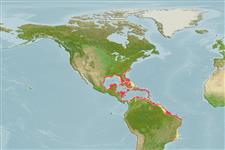Preferred temperature (Ref.
115969): 23.4 - 28, mean 25.9 (based on 342 cells).
Phylogenetic diversity index (Ref.
82804): PD
50 = 0.5000 [Uniqueness, from 0.5 = low to 2.0 = high].
Bayesian length-weight: a=0.01413 (0.01172 - 0.01702), b=2.99 (2.95 - 3.03), in cm Total Length, based on LWR estimates for this species (Ref.
93245).
Trophic level (Ref.
69278): 3.8 ±0.0 se; based on diet studies.
устойчивость к внешним воздействиям (Ref.
120179): средний (среднего размера), минимальное время удвоения популяции 1.4-4.4 года (K=0.16-0.35; tm=2; tmax=13; Fec=64,000).
Fishing Vulnerability (Ref.
59153): High vulnerability (62 of 100).
